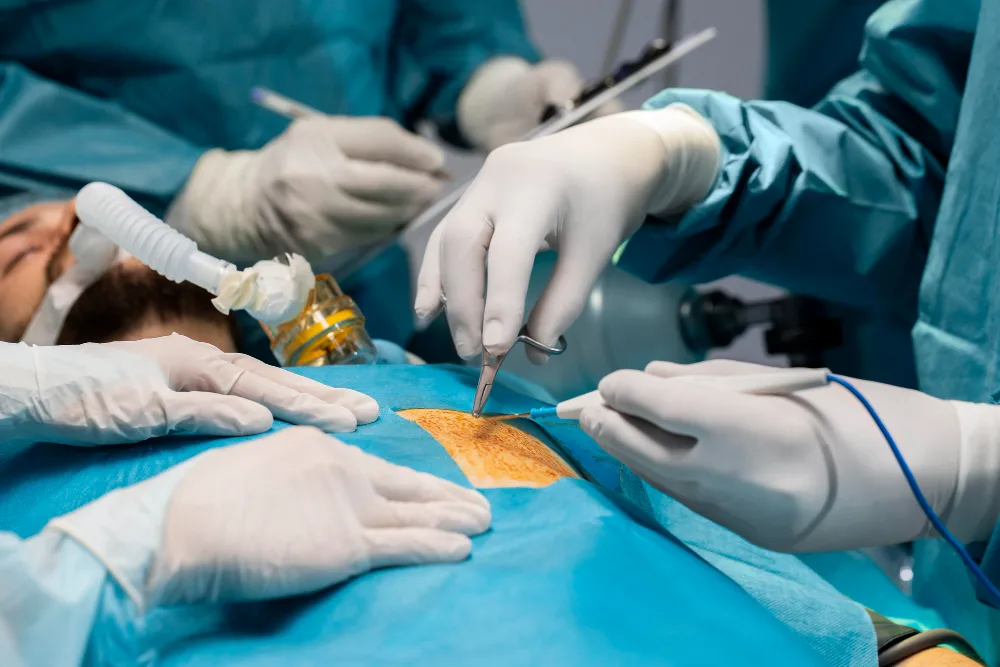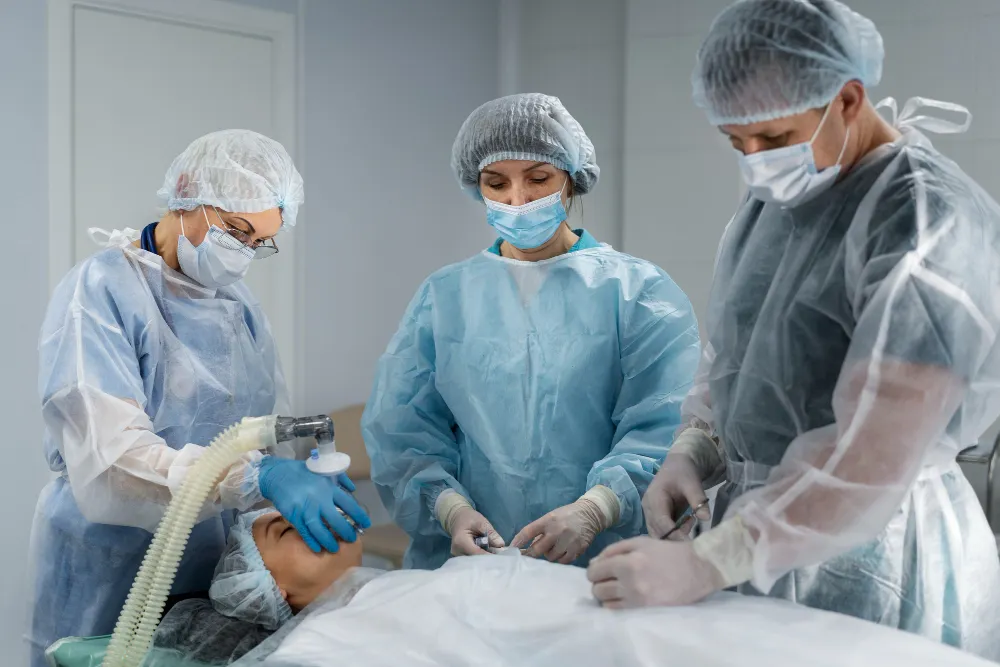Advanced MILB & Metabolic Surgery for Obesity and Diabetes
Get effective, minimally invasive MILB and metabolic surgery to manage obesity, reverse diabetes, and improve metabolic health with safe and lasting outcomes.

MILB & Metabolic Surgery
Modern healthcare is no longer just about treating disease it’s about transforming lives. MILB (Minimally Invasive and Laparoscopic Bariatric) & Metabolic Surgery represents that transformation offering patients a second chance at health, confidence, and long-term wellbeing.
At VS Hospitals, Chennai, the Department of Bariatric and Metabolic Surgery provides advanced, evidence-based procedures that help patients overcome obesity and its related metabolic disorders through safe, minimally invasive techniques. These surgeries are not about aesthetics they are about reclaiming control over your life, health, and happiness.

Early Detection Saves Lives
Early detection and treatment are crucial for improving the chances of survival. If you notice any concerning symptoms, consult a healthcare provider immediately.
Signs and Symptoms
weight gain
Rapid or consistent weight gain despite dietary efforts
Shortness of breath
Shortness of breath during mild activity or climbing stairs
fatigue
Persistent fatigue and low energy levels
Joint pain
Joint pain, back pain, or mobility issues
Snoring
Snoring or sleep disturbances (Sleep apnea)
Insulin
Insulin resistance, elevated blood sugar, or diabetes
High blood pressure
High blood pressure and cholesterol levels
Depression
Depression or low self-esteem due to weight-related issues
Blood in Urine
Hematuria - pink, red, or dark urine, the most common symptom
Frequent Urination
Feeling the need to urinate frequently, even when bladder is not full
Painful Urination
Experiencing pain or burning sensation while urinating
Back or Pelvic Pain
Pain that occurs as the cancer grows and spreads
Unexplained Weight Loss
Significant weight loss not related to diet or exercise
Fatigue
Feeling unusually tired or weak without a clear cause
Meet Our Experts in MILB & Metabolic Surgery
Risk Factors
Smoking
Smoking is one of the leading causes of bladder cancer. Chemicals in tobacco smoke can damage the lining of the bladder, increasing the risk.

Gender
Men are at a higher risk of developing bladder cancer than women.

Chronic Bladder Infections or Inflammation
Conditions such as bladder infections and long-term bladder inflammation can increase the risk.

Exposure to Chemicals
Prolonged exposure to certain chemicals, especially those used in the dye industry, rubber production, and chemical manufacturing, increases the risk.

Unhealthy diet
High intake of processed foods, refined sugars, and saturated fats.

Sedentary lifestyle
Lack of exercise or physical activity.

Genetics
Family history of obesity or metabolic disorders.

Hormonal imbalances
Thyroid disorders, insulin resistance, or PCOS.

Stress and sleep deprivation
Contribute to hormonal disruption and overeating.

Age and gender
Higher prevalence in individuals above 35 years; slightly more common in women.

Medications
Certain antidepressants, steroids, or insulin treatments can cause weight gain.

MILB & Metabolic Surgery
Diet and Nutrition
Prevention
Diagnosis
Key Services
Key Facilities
Diet plays a crucial role before and after metabolic surgery. The clinical dietitians at VS Hospitals create personalized meal plans to ensure optimal recovery and long-term success.
- Pre-Surgery Diet: High-protein, low-carb meals to reduce liver fat and prepare for surgery.
- Avoid Unhealthy Foods: Eliminate alcohol, sugary drinks, and fried foods for optimal liver and metabolic health.
- Hydration & Supplements: Maintain proper hydration and include vitamin or mineral support if required.
- Phase 1 – Liquids: Start with clear fluids for 3–5 days post-surgery to aid healing.
- Phase 2 & 3 – Protein & Soft Foods: Shift to protein shakes, pureed meals, and then soft foods for gradual adjustment.
- Phase 4 – Balanced Diet & Follow-up: Adopt lean proteins, vegetables, and whole grains with regular dietitian consultations for lasting results.
Regular follow-ups with dietitians help prevent nutritional deficiencies and ensure sustainable weight management.
Preventing metabolic syndrome and obesity starts with small but consistent lifestyle choices. VS Hospitals emphasizes preventive health education through its wellness clinics and counseling programs.
Preventive Tips:
- Stay Physically Active: Engage in 30–45 minutes of daily exercise like cardio, yoga, or strength training.
- Eat a Balanced Diet: Include fiber-rich, protein-packed, and antioxidant foods for better metabolism.
- Avoid Unhealthy Habits: Limit processed foods, sugary drinks, alcohol, and smoking.
- Maintain Good Sleep: Ensure 7–8 hours of regular, quality sleep each night.
- Schedule Regular Check-ups: Get annual screenings to detect and manage metabolic imbalances early.
- Manage Stress Effectively: Practice mindfulness, meditation, or relaxation techniques for emotional balance.
These preventive strategies not only reduce disease burden but also improve surgical outcomes for patients who eventually require MILB procedures.
Before recommending MILB or metabolic surgery, VS Hospitals conducts a comprehensive diagnostic assessment to ensure patient safety and suitability. Diagnostic steps include:
- Body Composition Analysis: Measures body fat percentage and muscle ratio
- Blood Tests: Evaluate glucose levels, lipid profile, liver and kidney function
- Hormonal Evaluation: Checks insulin resistance, thyroid hormones, and cortisol levels
- Imaging Studies: Ultrasound, endoscopy, or CT scan to assess abdominal organs
- Cardiac and Respiratory Evaluation: To confirm surgical fitness
- Psychological Evaluation: Ensures emotional readiness and post-surgery compliance
These investigations guide the bariatric team in choosing the most effective procedure gastric sleeve, gastric bypass, or mini-gastric bypass tailored to each individual.
VS Hospitals offers a comprehensive range of metabolic and bariatric surgical solutions backed by world-class expertise and technology.
Core Services Include:
- Laparoscopic Sleeve Gastrectomy: Reduces stomach size to promote satiety
- Roux-en-Y Gastric Bypass: Alters digestion to limit calorie absorption
- Mini-Gastric Bypass (MGB): Simplified bypass technique with minimal complications
- Metabolic Surgery for Diabetes: Restores insulin sensitivity and controls Type 2 diabetes
- Revision Bariatric Surgery: For patients with previous failed weight-loss surgeries
- Nutritional Counseling & Psychological Support: Continuous care before and after surgery
- Comprehensive Follow-up Programs: To monitor weight loss, nutrition, and overall health
Each patient at VS Hospitals undergoes a personalized treatment pathway designed to deliver safe, evidence-based outcomes.
The excellence of VS Hospitals lies not just in its skilled surgeons but also in its advanced infrastructure designed for patient comfort and safety.
- State-of-the-Art Operation Theatres equipped with 4K laparoscopic and robotic systems
- Dedicated Bariatric and Metabolic Unit with multidisciplinary experts
- Advanced ICU and Post-Operative Care Unit for continuous monitoring
- In-House Endoscopy and Imaging Centre for quick diagnostics
- Comprehensive Laboratory Services for pre- and post-surgery evaluations
- Rehabilitation and Physiotherapy Department to aid faster recovery
- Diet and Lifestyle Counseling Wing for sustained weight management
- Patient-Centric Rooms and Suites designed for comfort and privacy
Every aspect of care at VS Hospitals from pre-surgery counseling to long-term follow-up is handled with compassion, precision, and dedication to excellence.
Top Medical Facilities at Our Multispeciality Hospital – Here’s What Makes Us Different!
Ready to Begin Your MILB & Metabolic Surgery Care Journey?
Learn More About MILB & Metabolic Surgery Care
Frequently Asked Questions
Bariatric surgery primarily targets weight reduction, whereas metabolic surgery focuses on improving hormonal and metabolic disorders like diabetes. At VS Hospitals, both are integrated — addressing obesity while normalizing insulin sensitivity, cholesterol, and blood pressure.
MILB (Minimally Invasive Laparoscopic Bariatric) surgery at VS Hospitals is performed using cutting-edge laparoscopic technology that ensures minimal blood loss, reduced pain, faster recovery, and lower complication rates. The experienced surgical team follows global safety protocols for every patient.
Most patients resume light activities within 7–10 days post-surgery. A full recovery typically occurs within 4–6 weeks. Continuous follow-ups, nutritional counseling, and lifestyle adjustments at VS Hospitals ensure that patients regain strength and maintain long-term results
